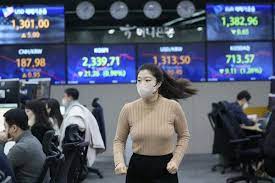BANGKOK (AP): Shares in Europe and Asia skidded Friday as central bank plans for more interest rate hikes rattled markets, according to Associated Press.
The fear is that the Federal Reserve and other central banks might bring on recessions by pushing rates higher to get inflation under control.
Oil prices sank nearly $2 a barrel and US futures were sharply lower.
The latest wave of selling came after central banks in Europe raised interest rates a day after the US Federal Reserve hiked its key rate again, emphasizing that interest rates will need to go higher than previously expected in order to tame inflation.
Like the Fed, central bank officials in Europe said inflation is not yet corralled and that more rate hikes are coming. The European Central Bank, Bank of England, and Switzerland’s central bank all pushed through half-point rate hikes on Thursday.
“We are in for a long game,” European Central Bank President Christine Lagarde said at a news conference Thursday.
Early Friday, Germany’s DAX was down 0.9 percent at 13,864.37 and Britain’s FTSE 100 slipped 1 percent to 7,352.86. In Paris, the CAC 40 also dropped 1 percent, to 6,458.10.
The future for the S&P 500 was 1 percent lower and that for the Dow Jones Industrial Average had lost 0.9 percent.
On Thursday, the S&P 500 fell 2.5 percent, the tech-heavy Nasdaq composite lost 3.2 percent and the Dow gave back 2.2 percent.
China’s move to relax COVID restrictions has raised hopes for an end to massive disruptions from lockdowns and other strict measures to prevent infections. But signs of sharply rising case numbers have raised uncertainty, with some alarmed over the possibility that the pandemic will continue to drag on the economy.
Hong Kong’s Hang Seng added 0.4 percent to 19,450.67, while the Shanghai Composite index ended less than 1 point lower at 3,167.86.
Tokyo’s Nikkei 225 lost 1.9 percent to 27,527.12 after a survey of manufacturers showed a further deterioration in the outlook for manufacturers.
The preliminary reading of a factory purchasing manager’s index put manufacturing at 48.8, down from November’s 49.0, on 0-100 scale where 50 marks the break between contraction and expansion.
“This is consistent with the downbeat production forecasts issued by firms. Lingering weakness in demand was likely the main cause,” Capital Economics said in a report.
The Kospi in Seoul lost less than 1 point to 2,360.02, while Australia’s S&P/ASX 200 declined 0.8 percent to 7,148.70.
Shares in Taiwan fell 1.4 percent and the SET in Bangkok lost 0.1 percent. Mumbai dropped 1.4 percent.
The Fed is slowing the pace of its rate increases but has signaled it expects rates to be higher over the coming few years than it had previously anticipated. That has disappointed investors who hoped recent signs that inflation is easing would persuade the Fed to lighten up on the brakes it’s applying to the US economy.
The federal funds rate stands at a range of 4.25 percent to 4.5 percent, the highest level in 15 years. Fed policymakers forecast that the central bank’s rate will reach a range of 5 percent to 5.25 percent by the end of 2023. Their forecast doesn’t call for a rate cut before 2024.
The central bank has been fighting to lower inflation at the same time that pockets of the economy, including employment and consumer spending, remain strong. That has made it more difficult to rein in high prices on everything from food to clothing.
On Thursday, the government reported that the number of Americans applying for unemployment benefits fell last week, a sign that the labor market remains strong. Meanwhile, another report showed that retail sales fell in November. That pullback followed a sharp rise in October.
In other trading Friday, benchmark US crude oil lost $1.93 to $74.18 a barrel in electronic trading on the New York Mercantile Exchange. It lost $1.17 on Thursday to $76.11 per barrel.
Brent crude, the pricing basis for international trading, shed $1.92 to $79.27 per barrel.
The dollar fell to 137.11 Japanese yen from 137.81 yen late Thursday. The euro fell to $1.0618 from $1.0627.







